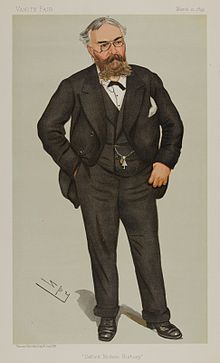Frederick York Powell
Frederick York Powell (born January 4, 1850 in Bloomsbury , London , † May 8, 1904 in Oxford ) was a historian. He was Regius Professor of Modern History at Oxford University .
He spent much of his youth in France and Spain, went to rugby school and studied at Oxford University from 1868 to 1872. He then became a lawyer (admitted in 1874) and taught law from 1874 at Christ Church College , Oxford. In 1894 he became Regius Professor of Modern History .
He had a variety of interests, dealt with Old Norse literature and worked here with Guðbrandur Vigfússon , but was also interested in French poetry and invited Paul Verlaine , Stéphane Mallarmé and Émile Verhaeren to lectures in Oxford. As a historian, he left less traces, but was stimulating as a teacher and stimulated the study of medieval literature in Great Britain.
In 1901 he received an honorary doctorate in Glasgow. He was President of the Folklore Society shortly before his death .
Fonts
- with Gudbrand Vigfusson Corpus poeticum boreale: the poetry of the Old Northern tongue, from the earliest times to the thirteenth century , 2 volumes, New York 1965
- with Vigfusson: Norse mythology; the Elder Edda in prose translation, Archon Books 1974
- with Vigfusson: Origines islandicae: a collection of the more important sagas and other native writings relating to the settlement and early history of Iceland, Millwood 1976
- Early England, up to the Norman conquest, New York: Harper 1877
- with Thomas Frederick Tout : History of England, 3 volumes, Longmans, Green 1898–1900
- Alfred the Great and William the Conqueror, London 1881
- He also contributed to an edition of the Danish History of Saxo Grammaticus by Oliver Elton and others
literature
- Oliver Elton: Frederick York Powell: A Life and Selection from his Letters and Occasional Writings, 1906
Web links
- Biography of Alison Petch, Pitt Rivers Museum
- Publications by Frederick York Powell in the Opac of the Regesta Imperii
Individual evidence
- ^ Dictionary of National Biography: Multifarious interests filled and distracted a life into which little of method entered; hence ... the non-production of any work of high interest and importance
| personal data | |
|---|---|
| SURNAME | Powell, Frederick York |
| BRIEF DESCRIPTION | British historian |
| DATE OF BIRTH | January 4, 1850 |
| PLACE OF BIRTH | London |
| DATE OF DEATH | May 8, 1904 |
| Place of death | Oxford |
